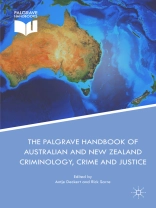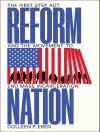This handbook engages key debates in Australian and New Zealand criminology over the last 50 years. In six sections, containing 56 original chapters, leading researchers and practitioners investigate topics such as the history of criminology; crime and justice data; law reform; gangs; youth crime; violent, white collar and rural crime; cybercrime; terrorism; sentencing; Indigenous courts; child witnesses and children of prisoners; police complaints processes; gun laws; alcohol policies; and criminal profiling. Key sections highlight criminological theory and, crucially, Indigenous issues and perspectives on criminal justice. Contributors examine the implications of past and current trends in official data collection, crime policy, and academic investigation to build up an understanding of under-researched and emerging problem areas for future research. An authoritative and comprehensive text, this handbook constitutes a long-awaited and necessary resource for dedicated academics, public policy analysts, and university students.
Daftar Isi
Section I: The crime and justice landscape.- 1. Fifty years of Australian criminology; Duncan Chappell.- 2. A short history of New Zealand criminology; James Rodgers and Philip Stenning.- 3. Public sector criminological research; Russell G Smith.- 4. The Asian and Pacific Conference of Correctional Administrators; David Biles.- 5. Crime and justice data; Fiona Dowsley and Timothy Hart.- 6. Crime, news, and the media; Judy Mc Gregor.- 7. Law reform targeting crime and disorder; Lorana Bartels and Rick Sarre.- Section II: Patterns of crime.- 8. Mapping common crime; Jason Payne and Fiona Hutton.- 9. Violent crime; Stuart Ross and Kenneth Polk.- 10. Commercial armed robbery; Emmeline Taylor.- 11. Outlaw motorcycle gangs; Mark Lauchs and Jarrod Gilbert.- 12. Samoan youth crime; Laumua Tunufa’i.- 13. Domestic violence, violence in close relationships, and violenceagainst women; Samantha Jeffries and Sharon Hayes.- 14. Sexual violence and harassment in the digital era; Anastasia Powell and Nicola Henry.- 15. Cybercrime; Roderic Broadhurst.- 16. Corporate and white collar crime; Fiona Haines.- 17. Corruption; Adam Graycar.- 18. Fraud victimisation and prevention; Tim Prenzler.- 19. Rural crime; Elaine Barclay.- 20. Transnational organised crime, border policing, and refugees; Michael Grewcock.- Section III: State and non-state responses.- 21. A Gallipoli trope on Australian peacekeeping; John Braithwaite.- 22. Terrorism and anti-terrorism laws; Selda Dagistanli and Scott Poynting.- 23. New Zealand penal policy in the twenty-first century; John Pratt.- 24. Sentencing theories, practices, and trends; James C. Oleson.- 25. Indigenous sentencing courts in Australia; Elena Marchetti.- 26. Restorative justice; Masahiro Suzuki and William Wood.- 27. Emotion and language in restorative youth justice; Hennessey Hayes.- 28. Child witnesses in criminal courts; Kirsten Hanna and Emily Henderson.- 29. Children of prisoners; Catherine Flynn and Anna Eriksson.- 30. Redress for historical institutional abuse of children; Kathleen Daly.- 31. Privatisation of criminal justice; Alice Mills.- 32. The third sector in criminal justice; Janet Ransley and Lorraine Mazerolle.- 33. The pluralisation of policing; Trevor Bradley.- 34. Policing and crime policy; Andrew Goldsmith.- 35. The police complaints process; John Buttle and Antje Deckert.- Section IV: Crime and justice through different theoretical lenses.- 36. Strain theory and crime; Li Eriksson and Lisa Broidy.- 37. Developmental and life-course criminology; Paul Mazerolle and Tara Renae Mc Gee.- 38. Left realist criminology; David Brown.- 39. Feminist criminology; Kathryn Henne.- 40. Convict criminology; Greg Newbold.- 41. Green criminology; Rob White and Sarah Wright Monod.- 42. Narrative criminology; Mark Halsey.- 43. Victims, legal consciousness, and legal mobilisation; Robyn Holder.- Section V: Indigenous perspectives on crime and justice.- 44. Indigenous peoples and criminal justice in Australia; Chris Cunneen and Amanda Porter.- 45. Māori experiences of colonisation and Māori criminology; Robert Webb.- 46. Colonial law, dominant discourses, and intergenerational trauma; Rawiri Waretini-Karena.- 47. Rangatahi courts; Khylee Quince.- 48. Māori and prison; Tracey Mc Intosh and Kim Workman.- 49. Crime and Māori in the media; Simone Bull.- 50. Doing research with the Indigenous domain as a non-Indigenous criminologist; Harry Blagg.- 51. Imagining an Indigenous criminological future; Juan Marcellus Tauri.- Section VI: Crime prevention policies.- 52. Australian gun laws; Philip Alpers.- 53.Alcohol, policies; Joseph M. Boden.- 54. Developmental prevention; Ross Homel and Kate Freiberg.- 55. Rehabilitation programmes in Australian prisons; Karen Heseltine and Andrew Day.- 56. Criminal profiling; Geoff Dean and Sarah Yule
Tentang Penulis
Dr Antje Deckert is a Senior Lecturer in Criminology at AUT. She is currently serving her second term as New Zealand Vice President of ANZSOC, and will be Visiting International Professor at Brock University, Canada in 2017.
Rick Sarre is Professor of Law and Criminal Justice at the University of South Australia’s Law School. He served four years as ANZSOC president (2012–2016), and in 2015 received an honorary doctorate from the Law School, Umeå University, Sweden.












